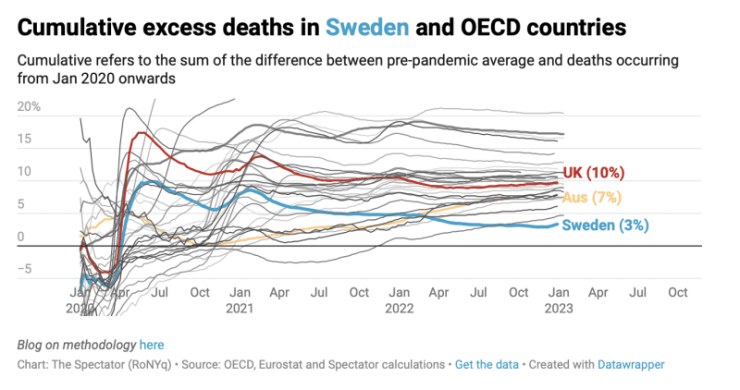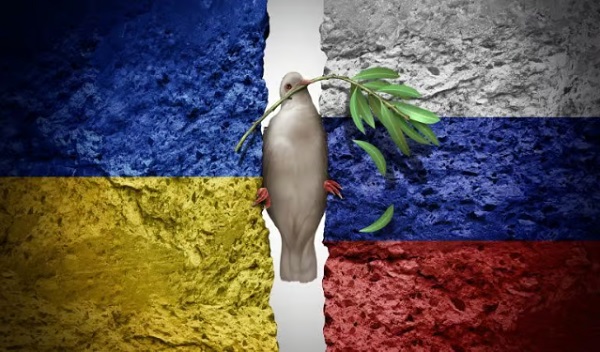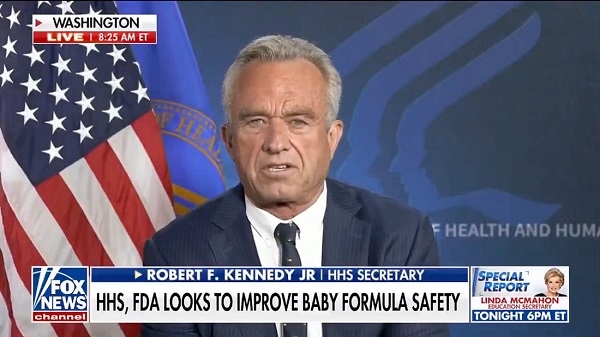Brownstone Institute
Sweden Did Exceptionally Well During the COVID-19 Pandemic

From the Brownstone Institute
BY
No wonder the news media are totally silent about the data that show that Sweden’s open society policy was what the rest of the world should have done, too. Numerous studies have shown Sweden’s excess death rate to be among the lowest in Europe during the pandemic and in several analyses, Sweden was at the bottom.

This is remarkable considering that Sweden has admitted that it did too little to protect people living in nursing homes.
Unlike the rest of the world, Sweden largely avoided implementing mandatory lockdowns, instead relying on voluntary curbs on social gatherings, and keeping most schools, restaurants, bars and businesses open. Face masks were not mandated and it was very rare to see any Swede dressed as a bank robber.
The Swedish Public Health Agency “gave more advice than threatened punishment” while the rest of the world installed fear in people. “We forbade families to visit their grandmother in the nursing home, we denied men attendance at their children’s births, we limited the number who were allowed to attend church at funerals. Maybe people are willing to accept very strong restrictions if the fear is great enough.”
If we turn to other issues than mortality, it is clear that the harms done by the draconian lockdowns in the rest of the world have been immense in all sorts of ways.
For any intervention in healthcare, we require proof that the benefits exceed the harms. This principle was one of the first and most important victims of the pandemic. Politicians all over the world panicked and lost their heads, and the randomised trials we so badly needed to guide us were never carried out.
We should abbreviate the great pandemic to the great panic.
In my book, “The Chinese virus: Killed millions and scientific freedom,” from March 2022, I have a section about lockdowns.
Lockdown, a questionable intervention
The reborn intolerance toward alternative ideas has been particularly acrimonious in the debate about lockdowns.
There are two main ways to respond to viral pandemics, described in two publications that both came out in October 2020.
The Great Barrington Declaration is only 514 words, with no references. It emphasizes the devastating effects of lockdowns on short- and long-term public health, with the underprivileged disproportionately harmed. Arguing that for children, COVID-19 is less dangerous than influenza, it suggests that those at minimal risk of death should live their lives normally to build up immunity to the virus through natural infection and to establish herd immunity in the society.
It recommends focused protection of the vulnerable. Nursing homes should use staff with acquired immunity and perform frequent PCR testing for COVID-19 of other staff and all visitors. Retired people living at home should have groceries and other essentials delivered to their home and should meet family members outside when possible.
Staying home when sick should be practiced by everyone. Schools, universities, sports facilities, restaurants, cultural activities, and other businesses should be open. Young low-risk adults should work normally, rather than from home.
I have not found anything in the Declaration to be factually wrong.
The other publication is the John Snow Memorandum, which came out two weeks later. Its 945 words are seriously manipulative. There are factual inaccuracies, and several of its 8 references are to highly unreliable science. The authors claim that SARS-CoV-2 has high infectivity, and that the infection fatality rate of COVID-19 is several times higher than that of seasonal influenza.
This is not correct (see Chapter 5), and the two references the authors use are to studies using modelling, which are highly bias-prone.
They also claim that transmission of the virus can be mitigated through the use of face masks, with no reference, even though this was, and still is, a highly doubtful claim.
“The proportion of vulnerable people constitute as much as 30% of the population in some regions.” This was cherry-picking from yet another modelling study whose authors defined increased risk of severe disease as one of the conditions listed in some guidelines. With such a broad definition, it is easy to scare people. However, they did not tell their readers that the modelling study also estimated that only 4% of the global population would require hospital admission if infected,36 which is similar to influenza.
The two declarations did not elicit enlightened debates, but strongly emotional exchanges of views on social media devoid of facts. The vitriolic attacks were almost exclusively directed against those supporting the Great Barrington Declaration, and many people, including its authors, experienced censorship from Facebook, YouTube and Twitter.
The Great Barrington Declaration has three authors; the John Snow Memorandum has 31. The former was published on a website, which is kept alive, the latter in Lancet, which gives its many authors prestige.
In 2021, over 900,000 people had signed the Great Barrington Declaration, including me, as I have always found that the drastic lockdowns we have had, with all its devastating consequences for our societies, were neither scientifically nor ethically justified. I did Google searches to get an idea how much attention the two declarations have had. For the Great Barrington Declaration, there were 147,000 results; for the John Snow Memorandum only 5,500.
The Great Barrington Declaration has not had much political impact. It is much easier for politicians to be restrictive than keeping the societies open. Once a country has taken drastic measures, such as lockdowns and border closings, other countries are accused of being irresponsible if they don’t do the same – even though their effect is unproven. Politicians will not get in trouble for measures that are too draconian, only if it can be argued that they did too little.
In March 2021, Martin Kulldorff and Jay Bhattacharya, two of the three authors of the Great Barrington Declaration, drew attention to some of the consequences of the current climate of intolerance. In many cases, eminent scientific voices have been effectively silenced, often with gutter tactics. People who oppose lockdowns have been accused of having blood on their hands and their university positions threatened.
Many have chosen to stay quiet rather than face the mob, for example Jonas Ludvigsson, after he had published a ground-breaking Swedish study making it clear that it is safe to keep schools open during the pandemic, for children and teachers alike. This was taboo.
Kulldorff and Bhattacharya argued that with so many COVID-19 deaths, most of which have been in old people, it should be obvious that lockdown strategies have failed to protect the old.
The attacks on the Great Barrington Declaration appear to have been orchestrated from the top. On 8 October 2020, Francis Collins, the director of the US National Institutes of Health (NIH), sent a denigrating email to Anthony Fauci, director of the National Institute of Allergy and Infectious Diseases and advisor for several US Presidents, where he wrote:
“This proposal from the three fringe epidemiologists who met with the Secretary seems to be getting a lot of attention – and even a co-signature from Nobel Prize winner Mike Leavitt at Stanford. There needs to be a quick and devastating published take down of its premises. I don’t see anything like that online yet – is it underway?”
Stefan Baral, an epidemiologist from Johns Hopkins, reported that a letter he wrote about the potential harms of population-wide lockdowns in April 2020 was rejected by more than 10 scientific journals and 6 newspapers, sometimes with the pretence that there was nothing useful in it. It was the first time in his career that he could not get a piece placed anywhere.
In September 2021, BMJ allowed Gavin Yamey and David Gorski to publish an attack on the Great Barrington Declaration called, Covid-19 and the new merchants of doubt. A commentator hit the nail when he wrote:
“This is a shoddy smear that is not for publication. The authors have not shown where their targets are scientifically incorrect, they just attack them for receiving funding from sources they dislike or having their videos and comments removed by social media corporations as if that was some indication of guilt.”
Kulldorff has explained what is wrong with the article. They claimed the Declaration provides support to the anti-vaccine movement and that its authors are peddling a “well-funded sophisticated science denialist campaign based on ideological and corporate interests.” But nobody paid the authors any money for their work or for advocating focused protection, and they would not have undertaken it for a professional gain, as it is far easier to stay silent than put your head above the parapet.
Gorski is behaving like a terrorist on social media, and he is perhaps a troll. Without having any idea what I had decided to talk about, or what my motives and background were, he tweeted about me in 2019 that I had “gone full on antivax.” My talk was about why I am against mandatory vaccination for an organisation called Physicians for Informed Consent. Who could be against informed consent? But when I found out who the other speakers were, I cancelled my talk.
In January 2022, Cochrane published a so-called rapid review of the safety of reopening schools or keeping them open. The 38 included studies comprised 33 modelling studies, three observational studies, one quasi‐experimental and one experimental study with modelling components. Clearly, nothing reliable can come out of this, which the authors admitted: “There were very little data on the actual implementation of interventions.”
Using modelling, you can get any result you want, depending on the assumptions you put into the model. But the authors’ conclusion was plain nonsense: “Our review suggests that a broad range of measures implemented in the school setting can have positive impacts on the transmission of SARS‐CoV‐2, and on healthcare utilisation outcomes related to COVID‐19.”
They should have said that since there were no randomised trials, we don’t know if school closures do more good than harm. What they did is what Tom Jefferson has called “garbage in and garbage out … with a nice little Cochrane logo on it.”
About the failing scientific integrity of Cochrane reviews, the funder of the UK Cochrane groups noted in April 2021 that, “This is a point raised by people in the Collaboration to ensure that garbage does not go into the reviews; otherwise, your reviews will be garbage.”
Even though there was nothing to conclude from it, the authors filled 174 pages – about the length of the book you are currently reading – about the garbage they included in their review, which was funded by the Ministry of Education and Research in Germany.
A 2020 rapid systematic review in a medical journal found that school closures did not contribute to the control of the SARS epidemic in China, Hong Kong, and Singapore.
Lockdowns could even make matters worse. If children are sent home to be looked after by their grandparents because their parents are at work, it could bode disaster for the grandparents. Before the COVID-19 vaccines became available, the median age of those who died was 83.
The whole world missed a fantastic opportunity to find out what the truth was by randomising some schools to be closed while keeping others open, but such trials were never done. Atle Fretheim, research director at the Norwegian Institute of Public Health, tried to do a trial but failed. In March 2020, Norwegian government officials were unwilling to keep schools open. Two months later, as the virus waned, they refused to keep schools closed. Norwegian TV shot the messenger: “Crazy researcher wants to experiment with children.” What was crazy was not to do the study. Craziness was also the norm in USA. In many large American cities, bars were open while schools were closed.
When people argue for or against lockdowns and how long they should last and for whom, they are on uncertain ground. Sweden tried to go on with life as usual, without major lockdowns. Furthermore, Sweden has not mandated the use of face masks and very few people have used them.
Brownstone Institute
Hysteria over Robert F. Kennedy Jr.’s Promise to Make Vaccines Safer

From the Brownstone Institute
By
“People are reacting because they hear things about me that aren’t true, characterizations of things I have said that are simply not true. When they hear what I have to say, actually, about vaccines, everybody supports it.”
Robert F. Kennedy, Jr. has been confirmed as Secretary of the US Department of Health and Human Services.
Within hours, my news feed was populated with angsty articles hand-wringing about the future of vaccines under Kennedy, whom legacy media and the establishment are certain would confiscate life-saving vaccine programs, raising the spectre of mass waves of illness and death.
In particular, this quote from Senator Mitch McConnell (R-KY), the only Republican who voted against Kennedy’s confirmation, appeared over and over again:
“I’m a survivor of childhood polio. In my lifetime, I’ve watched vaccines save millions of lives from devastating diseases across America and around the world. I will not condone the re-litigation of proven cures, and neither will millions of Americans who credit their survival and quality of life to scientific miracles.”
Yet, I could not find one piece of mainstream coverage of this quote that mentioned the astonishing fact that 98% of polio cases in 2023, the most recent year for which we have full data, were caused by the polio vaccine.
You read that correctly. In 2023, 12 wild polio cases were recorded (six in Afghanistan, six in Pakistan), with a further 524 circulating vaccine-derived cases, mostly throughout Africa. This trend is in keeping with data from the previous several years.
An important contextualising detail, wouldn’t you think?

The cause of this polio resurgence is that the world’s poor are given the oral polio vaccine (OPV), which contains a weakened virus that can replicate in the gut and spread in feces, causing vaccine-derived outbreaks.
People in rich countries get the inactivated polio vaccine (IPV), which does not contain live virus and therefore does not carry the risk of spreading the very disease it’s vaccinating against.
The World Health Organization (WHO) and vaccine-promoting organisations say that the way out of the problem is to vaccinate harder, as the argument goes that outbreaks only occur in under-vaccinated communities.
This may be well and good, but the total omission of the fact from media coverage that the goalposts have shifted from eradicating wild polio (not yet complete but nearly there, according to the WHO) to eradicating vaccine-derived polio (the main problem these days) underscores that this is why hardly anyone who knows anything trusts the media anymore.
A member of my extended family has polio. It’s nasty and life-altering and I wouldn’t wish it on anyone.
That’s why I would hope that any vaccines given would be safe – contracting polio from the supposedly preventative vaccine is the worst-case scenario, second only to death.
This is Kennedy’s expressly stated aim.
“When people actually hear what I think about vaccines, which is common sense, which is vaccines should be tested, they should be safe, everyone should have informed consent,” he said at his confirmation press conference.
“People are reacting because they hear things about me that aren’t true, characterisations of things I have said that are simply not true.
“When they hear what I have to say, actually, about vaccines, everybody supports it.”
Grown-ups who support vaccines can walk and chew gum. From the point of view of the public health establishment, the polio vaccine has prevented millions of cases and has nearly eradicated the disease.
At the same time, the world’s poorest are afflicted with polio outbreaks which we can work to prevent, and the safety of all polio vaccine products on the market should be subject to the rigorous standards applied to all other medicines.
Unless you think that poor people don’t matter, in which case the status quo might suit you fine.
Republished from the author’s Substack
Brownstone Institute
The New Enthusiasm for Slaughter

From the Brownstone Institute
By
What War Means
My mother once told me how my father still woke up screaming in the night years after I was born, decades after the Second World War (WWII) ended. I had not known – probably like most children of those who fought. For him, it was visions of his friends going down in burning aircraft – other bombers of his squadron off north Australia – and to be helpless, watching, as they burnt and fell. Few born after that war could really appreciate what their fathers, and mothers, went through.
Early in the movie Saving Private Ryan, there is an extended D-Day scene of the front doors of the landing craft opening on the Normandy beaches, and all those inside being torn apart by bullets. It happens to one landing craft after another. Bankers, teachers, students, and farmers being ripped in pieces and their guts spilling out whilst they, still alive, call for help that cannot come. That is what happens when a machine gun opens up through the open door of a landing craft, or an armored personnel carrier, of a group sent to secure a tree line.
It is what a lot of politicians are calling for now.
People with shares in the arms industry become a little richer every time one of those shells is fired and has to be replaced. They gain financially, and often politically, from bodies being ripped open. This is what we call war. It is increasingly popular as a political strategy, though generally for others and the children of others.
Of course, the effects of war go beyond the dismembering and lonely death of many of those fighting. Massacres of civilians and rape of women can become common, as brutality enables humans to be seen as unwanted objects. If all this sounds abstract, apply it to your loved ones and think what that would mean.
I believe there can be just wars, and this is not a discussion about the evil of war, or who is right or wrong in current wars. Just a recognition that war is something worth avoiding, despite its apparent popularity amongst many leaders and our media.
The EU Reverses Its Focus
When the Brexit vote determined that Britain would leave the European Union (EU), I, like many, despaired. We should learn from history, and the EU’s existence had coincided with the longest period of peace between Western European States in well over 2,000 years.
Leaving the EU seemed to be risking this success. Surely, it is better to work together, to talk and cooperate with old enemies, in a constructive way? The media, and the political left, center, and much of the right seemed at that time, all of nine years ago, to agree. Or so the story went.
We now face a new reality as the EU leadership scrambles to justify continuing a war. Not only continuing, but they had been staunchly refusing to even countenance discussion on ending the killing. It has taken a new regime from across the ocean, a subject of European mockery, to do that.
In Europe, and in parts of American politics, something is going on that is very different from the question of whether current wars are just or unjust. It is an apparent belief that advocacy for continued war is virtuous. Talking to leaders of an opposing country in a war that is killing Europeans by the tens of thousands has been seen as traitorous. Those proposing to view the issues from both sides are somehow “far right.”
The EU, once intended as an instrument to end war, now has a European rearmament strategy. The irony seems lost on both its leaders and its media. Arguments such as “peace through strength” are pathetic when accompanied by censorship, propaganda, and a refusal to talk.
As US Vice-President JD Vance recently asked European leaders, what values are they actually defending?
Europe’s Need for Outside Help
A lack of experience of war does not seem sufficient to explain the current enthusiasm to continue them. Architects of WWII in Europe had certainly experienced the carnage of the First World War. Apart from the financial incentives that human slaughter can bring, there are also political ideologies that enable the mass death of others to be turned into an abstract and even positive idea.
Those dying must be seen to be from a different class, of different intelligence, or otherwise justifiable fodder to feed the cause of the Rules-Based Order or whatever other slogan can distinguish an ‘us’ from a ‘them’…While the current incarnation seems more of a class thing than a geographical or nationalistic one, European history is ripe with variations of both.
Europe appears to be back where it used to be, the aristocracy burning the serfs when not visiting each other’s clubs. Shallow thinking has the day, and the media have adapted themselves accordingly. Democracy means ensuring that only the right people get into power.
Dismembered European corpses and terrorized children are just part of maintaining this ideological purity. War is acceptable once more. Let’s hope such leaders and ideologies can be sidelined by those beyond Europe who are willing to give peace a chance.
There is no virtue in the promotion of mass death. Europe, with its leadership, will benefit from outside help and basic education. It would benefit even further from leadership that values the lives of its people.
-

 2025 Federal Election2 days ago
2025 Federal Election2 days agoPoilievre refuses to bash Trump via trick question, says it’s possible to work with him and be ‘firm’
-

 International2 days ago
International2 days agoVice President Vance, Second Lady to visit Greenland on Friday
-

 Community2 days ago
Community2 days agoSupport local healthcare while winning amazing prizes!
-

 Daily Caller2 days ago
Daily Caller2 days agoCover up of a Department of Energy Study Might Be The Biggest Stain On Biden Admin’s Legacy
-

 COVID-192 days ago
COVID-192 days ago17-year-old died after taking COVID shot, but Ontario judge denies his family’s liability claim
-

 Business2 days ago
Business2 days agoWhile “Team Canada” attacks Trump for election points, Premier Danielle Smith advocates for future trade relations
-

 2025 Federal Election1 day ago
2025 Federal Election1 day agoFool Me Once: The Cost of Carney–Trudeau Tax Games
-

 2025 Federal Election2 days ago
2025 Federal Election2 days agoPoilievre to let working seniors keep more of their money












